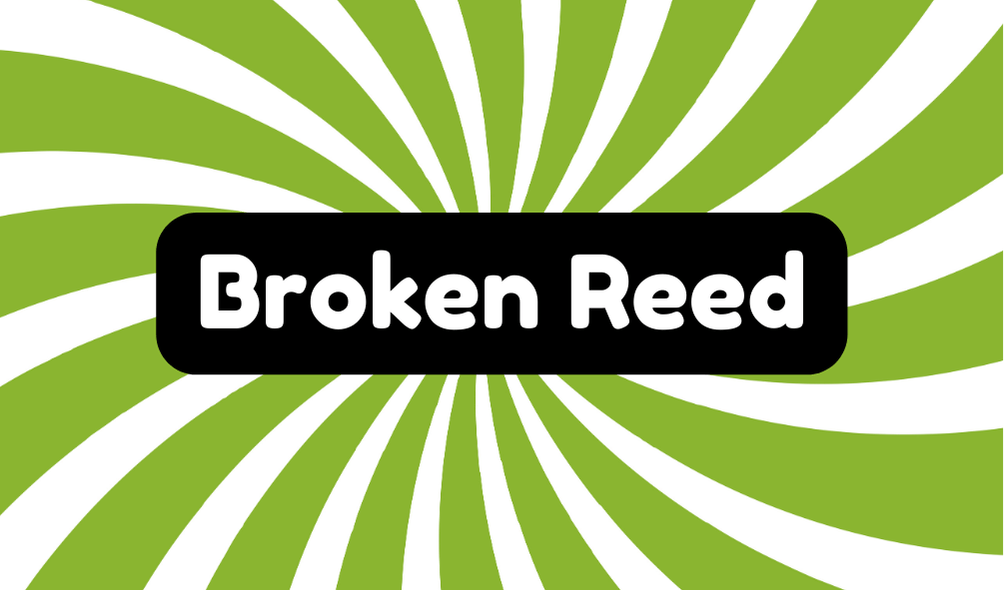The phrase "broken reed" refers to a metaphorical symbol of unreliability and fragility in support systems. Originating from biblical scripture, particularly Isaiah 36:6, it emphasizes the dangers of misplaced trust. In contemporary usage, it illustrates situations where reliance on weak allies or resources leads to failure. For example, one might say, "Depending on him during the crisis felt like leaning on a broken reed." This expression remains relevant today, reflecting the challenges of discerning trustworthiness in relationships and alliances. Understanding its nuances can enhance your perspective on reliability in various contexts and situations.
Synonyms
In discussions of reliability and support, the term "broken reed" can evoke numerous synonyms that encapsulate its meaning. These terms highlight the characteristics of weak support and the implications of depending on an unreliable ally. Understanding these synonyms helps clarify the risks involved in reliance on such supports.
- Fragile resource
- Untrustworthy partner
- Ineffectual backing
- Flimsy support
These alternative expressions emphasize the inherent dangers associated with weak support systems. When innovative strategies are in play, one must cautiously evaluate their allies and resources. Leaning on unreliable entities can lead to detrimental consequences. Consequently, recognizing the synonyms of "broken reed" fosters a more insightful perspective on the dynamics of trust and dependability.
Example of Sentences
The phrase "broken reed" serves as a powerful metaphor for unreliable support, often illustrating instances where trust is misplaced. Its metaphorical usage underscores vulnerabilities in multiple contexts, inspiring both literary analysis and caution in decision-making. Here are some examples that encapsulate this concept:
- "Depending on him during the crisis felt like leaning on a broken reed."
- "She quickly realized that the promise was nothing more than a broken reed."
- "The outdated software proved to be a broken reed during the vital data transfer."
- "His assurances turned out to be a broken reed when the project faced challenges."
These sentences reflect the notion that placing trust in something inherently weak can lead to disappointment, encouraging a more discerning approach to reliance and support.
Origin
Originating from biblical scripture, the phrase "broken reed" signifies a metaphorical expression of unreliability and false trust. This imagery, particularly rooted in Isaiah 36:6, criticizes the misguided reliance on fragile supports, such as alliances with Egypt. Its cultural significance extends beyond scripture, manifesting in literary references throughout history. Remarkably recorded in English around 1593, the expression has transcended its origins, gaining traction in various contexts. Each reappearance emphasizes the importance of discerning between robust and flimsy support systems. While many embrace this vivid metaphor, one must approach its usage critically; it serves as a cautionary reminder that appearances can be deceiving. In an era of innovation, maintaining an awareness of underlying strengths is paramount for informed decision-making.
Collocations
Collocations associated with the phrase "broken reed" reflect its nuanced meaning in various contexts. These phrases illustrate both literary and practical applications, emphasizing the symbolism of weakness and unreliability. Understanding these collocations in literature can enhance one's comprehension of character motivations and themes. Here are four notable collocations:
- Trusting a broken reed – highlights misplaced reliance.
- Leaning on a broken reed – underscores vulnerability.
- Broken reed analogy – serves as a metaphor for fragility.
- Broken reed defense – evokes a sense of weakness in strategy.
These examples reinforce the "broken reed" symbolism, reminding us that reliance on weak supports can lead to failure. Awareness of such expressions fosters critical thinking about trust and resilience in both literature and life.
How to Use in Everyday Language
Utilizing the phrase "broken reed" in everyday language can effectively convey the concept of unreliability and fragility. It serves as a powerful metaphor in both contextual usage and conversational applications. For instance, when describing an unreliable ally, one might say, "Counting on his support was like leaning on a broken reed." Such expressions highlight the importance of recognizing weaknesses in people or systems around us. Furthermore, employing this phrase encourages critical thinking about whom or what we choose to rely on. By incorporating "broken reed" into discussions, we foster an environment that values dependability, warning others against the potential pitfalls of misplaced trust. Ultimately, these moments of critical discourse enable us to navigate complex relationships with greater awareness.
Why Is It Still Relevant Today?
Although language evolves over time, the phrase "broken reed" remains relevant today as it aptly captures the ongoing challenges of discerning reliability in relationships, systems, and institutions. Its cultural significance endures, warning us against misplaced trust in unreliable entities. In an era where misinformation spreads rapidly and allegiances often shift, recognizing a "broken reed" can safeguard us from detrimental consequences. Modern applications of this phrase can be found in various contexts, from political alliances to personal relationships, acting as a reminder to critically evaluate our support structures. The relevance of "broken reed" underscores a critical mindset essential for innovation; we must remain vigilant and discerning, ensuring that our foundations are built on true reliability, not simply illusions of strength.







